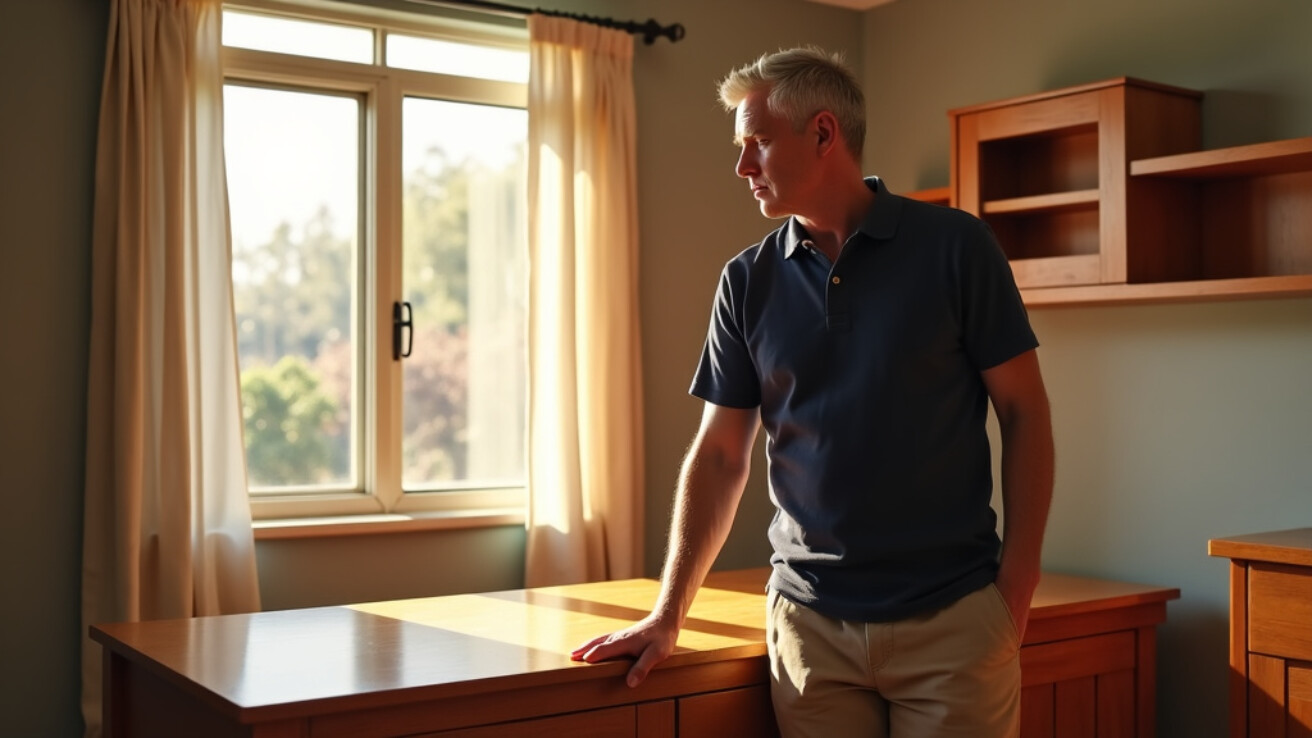John stood in his son’s empty bedroom, running his fingers along the dusty sports trophies and faded photographs. After decades of bustling family dinners, weekend games, and late-night conversations, the silence felt deafening. Like many fathers facing empty nest syndrome, he struggled to express the profound sense of loss that overwhelmed him.
While society often focuses on mothers’ experiences when children leave home, fathers face their own distinct emotional journey through this transition. According to research on paternal empty nest experiences, men frequently internalize their feelings, wrestling silently with their changing identity and purpose.
The transformation especially affects fathers who’ve been actively involved in their children’s daily lives – from coaching sports teams to sharing hobbies and weekend adventures. These dads often find themselves grappling with both the physical absence of their children and the sudden void in their routine and sense of purpose.
Beneath these quiet struggles lies a powerful story of transition and growth. As we examine the challenges fathers face when their children leave home, we’ll explore strategies for embracing this new chapter while maintaining meaningful connections with adult children.
Understanding Fathers’ Emotional Response

When children leave home, fathers face a profound emotional journey that society often overlooks. The transition triggers a complex mix of pride, loss, and vulnerability that challenges traditional notions of masculine stoicism.
Empty nest syndrome affects fathers uniquely, as they struggle to express emotional vulnerability amid societal expectations and traditional gender roles. Many find themselves balancing pride in their children’s independence with an unexpected sense of purposelessness.
Research from clinical studies reveals that fathers experience significant psychological stress during this transition, manifesting through grief, loss, and difficulty adapting to their evolving parental role.
The Complex Nature of Paternal Response
For many fathers, their identity has centered on being providers and protectors. The shift from active parenting to a more supportive role can create a profound sense of displacement.
Fathers often internalize their struggles, hindering healthy emotional processing. This pattern of emotional suppression can lead to increased anxiety and depression during the empty nest phase.
The transition significantly affects a father’s sense of purpose, especially for those who deeply identified with their daily caregiving and mentoring roles. This change prompts fundamental questions about identity beyond parenthood.
Adapting to New Family Dynamics
Modern fathers often share closer bonds with their children than previous generations did, making the separation particularly challenging. These stronger emotional connections amplify the impact of their children’s departure.
The experience leads many fathers to reassess their marriages as focus shifts from co-parenting to rekindling their relationship as a couple. This period of adjustment can strengthen partnerships or reveal underlying challenges.
Fathers actively seek ways to maintain meaningful connections with their adult children while honoring their independence. Finding this balance becomes essential to their emotional well-being.
The Silent Struggle: Why Fathers May Not Seek Help
When children leave the nest, fathers often face an invisible battle with their emotions. According to research on empty nest syndrome, suppressing these feelings can lead to serious consequences like depression, strained relationships, and a profound sense of stagnation.
Society’s rigid expectations of masculinity create an environment where fathers feel compelled to maintain a stoic facade. The pressure to appear ‘strong’ and ‘unwavering’ leaves many suffering in silence, unable to acknowledge their emotional turmoil when children depart.
The Weight of Cultural Expectations
Traditional masculine norms often paint vulnerability as weakness, making it particularly challenging for fathers to admit their struggles. Many internalize these stereotypes, believing they shouldn’t need emotional support even during major life transitions.
Studies show approximately 10% of fathers experience significant emotional distress during major parenting transitions, yet they’re far less likely than mothers to seek professional help. This reluctance stems from deeply ingrained cultural messaging about male strength and self-reliance.
The stigma surrounding men’s mental health creates additional barriers, as fathers often worry about being perceived as ‘weak’ for acknowledging their emotional needs. This fear of judgment frequently prevents them from seeking support when they need it most.
The Cost of Emotional Suppression
When fathers suppress their empty nest feelings, the consequences can ripple throughout their lives. Some turn to unhealthy coping mechanisms like alcohol or workaholism to numb their sense of loss.
The emotional toll manifests in physical symptoms – from disrupted sleep patterns to increased stress levels. Without healthy outlets for processing their feelings, many fathers struggle with unexpressed grief and anxiety.
Research indicates that fathers who suppress their emotions during major life transitions are more likely to experience depression and relationship difficulties. The burden of maintaining a brave face can lead to emotional disconnection from both their partner and adult children.
Breaking the Silence
It’s crucial to recognize that seeking support isn’t a sign of weakness – it’s an act of courage and self-awareness. Fathers deserve the same emotional support and understanding that mothers receive during the empty nest transition.
Support groups and counseling services specifically designed for fathers provide safe spaces to process these complex emotions. Open conversations about fathers’ mental health help normalize these feelings and encourage more men to seek help.
By challenging outdated stereotypes about masculinity and emotion, we can create a more supportive environment where fathers feel empowered to express their feelings openly. The journey through empty nest syndrome doesn’t have to be a solitary one.
Redefining Fatherhood in the Empty Nest Phase

The quietness of an empty house can feel jarring for fathers who’ve spent decades with the bustling energy of children at home. This transition, while challenging, opens doors to profound personal growth and evolving relationships with adult children.
The role of fatherhood doesn’t end when children leave – it transforms into something equally meaningful but distinctly different. As research shows, establishing healthy boundaries and creating intentional schedules for family time becomes essential during this phase.
This period offers fathers a chance to rediscover passions and interests that took a backseat during active parenting years. Whether rekindling an old hobby or exploring new ventures, embracing personal growth enriches both life and relationships.
Nurturing Adult Relationships with Children
Communication evolves significantly in the empty nest phase. Beyond daily schedules and household rules, conversations now center on sharing life experiences and fostering mutual respect as adults.
Modern technology provides meaningful ways to stay connected. Regular video calls, photo sharing, and even online gaming sessions create fresh bonding experiences while respecting everyone’s independence.
Establishing new traditions becomes vital during this transition. Instead of dwelling on past routines, create fresh ways to connect that honor your children’s adulthood while strengthening family bonds.
Remember that your adult children are navigating their own life changes. Supporting their independence while remaining emotionally present helps build a stronger, more mature relationship.
Consider scheduling regular one-on-one time with each child, allowing for deeper conversations and individual connections that may have been challenging in a busy household.
Embracing Personal Renaissance
The empty nest phase offers a unique opportunity for self-discovery. Many fathers find this time ideal for pursuing education, starting new careers, or exploring long-held interests.
Physical wellness naturally becomes a priority during this transition. With additional time available, establishing a consistent exercise routine or learning about nutrition can provide both structure and health benefits.
Community involvement creates another path for personal growth. Through volunteering, joining clubs, or mentoring others, your life experience can make meaningful contributions beyond family life.
View this phase as an opportunity to redefine your sense of purpose. Your role as a father hasn’t ended – it’s evolved into something equally fulfilling in different ways.
Remember that feeling both excitement and uncertainty during this transition is natural. Embrace this journey of discovery while nurturing family connections in new, mature ways.
Coping Strategies for Fathers Facing an Empty Nest
When the last child leaves home, fathers experience a complex mix of emotions that can be challenging to navigate. While society often focuses on mothers’ experiences with empty nest syndrome, fathers face equally significant adjustments during this transition.
Research from FHE Health shows that having a strong support system is crucial for strengthening parental resilience and improving overall well-being during this period. Here are effective strategies specifically tailored for fathers.
Embrace Physical and Mental Wellness
Taking care of your physical and emotional health becomes vital during the empty nest transition. Regular exercise not only improves physical fitness but also helps combat feelings of loneliness and loss.
Mindfulness practices like meditation can help you stay grounded and present, reducing anxiety and stress that often accompany this life change. Consider starting with just 5-10 minutes of quiet reflection each day.
Maintaining a balanced diet and ensuring adequate sleep are essential components of self-care during this adjustment period. These fundamental habits create a strong foundation for emotional resilience.
Reconnect with Your Partner
The empty nest phase offers a unique opportunity to strengthen your marriage or partnership. With children no longer the central focus, you can rediscover each other as individuals and partners.
Consider planning regular date nights or taking up a new hobby together. This shared time can help rebuild emotional intimacy that may have taken a backseat during active parenting years.
Open communication about your feelings and expectations for this new chapter is essential. Remember that partners may process this transition differently, and that’s perfectly normal.
Pursue Personal Interests and Growth
Now is an ideal time to revisit old passions or explore new interests you’ve put aside while raising children. Whether it’s woodworking, photography, or learning a musical instrument, engaging in meaningful activities provides a sense of purpose.
Consider joining clubs or groups related to your interests. These social connections can help fill the void and create opportunities for new friendships with others who share your passions.
Professional development or educational pursuits can also offer fulfillment and a fresh sense of identity beyond fatherhood. Many fathers find satisfaction in mentoring others or volunteering in their communities.
Maintain Healthy Connections with Adult Children
While it’s important to give your children space to establish their independence, maintaining regular contact helps ease the transition. Schedule periodic check-ins but avoid overwhelming them with constant communication.
Focus on developing a new kind of relationship with your adult children. This might mean becoming more of a mentor or friend while moving beyond the traditional father-child dynamic.
Remember that your role hasn’t ended – it’s simply evolving. Your wisdom and support remain valuable to your children, just in different ways than before.
The Role of Partnership in Empty Nest Adaptation

The journey of adjusting to an empty nest presents unique challenges, yet it offers couples a meaningful opportunity to rediscover and strengthen their relationship. When children leave home, partners can support each other through this significant life transition.
Research from leading relationship experts reveals that couples who maintain strong connections during the empty nest phase experience increased intimacy and relationship satisfaction. Success stems from approaching this transition as a team, acknowledging both its challenges and opportunities.
Communication proves especially vital during this period of adjustment. Rather than avoiding difficult conversations, resilient couples make time to share their feelings openly, whether expressing sadness about missing their children or excitement about new possibilities.
Creating a Shared Vision for the Future
Thriving empty nest couples actively discuss their hopes and dreams for this new chapter. Their plans often include future adventures, shared hobbies, and creative ways to use their newfound freedom.
According to Psychology Today, successful partners embrace both the joy and sadness of this transition, recognizing that experiencing conflicting emotions is natural.
Many couples strengthen their bond by setting aside dedicated time for connection. Regular date nights and weekend getaways become essential catalysts for relationship growth.
Supporting Each Other Through the Adjustment
Partners provide invaluable emotional support during this transition. When one spouse feels vulnerable, the other offers comfort without rushing to fix or dismiss those feelings.
Successful empty nest couples discover meaningful ways to show appreciation for each other. Simple gestures like expressing gratitude or listening attentively help partners feel valued and understood.
Each person processes this transition differently. Some partners need more time to adjust, while others readily embrace change.
Rebuilding Your Partnership Identity
Couples often find fulfillment in treating this phase as an opportunity to rediscover their shared identity. This includes revisiting pre-parenthood activities or exploring new interests together.
Creating new routines and traditions helps partners establish a fresh sense of normalcy. Whether cooking dinner together or taking morning walks, these shared activities deepen their connection.
Empty nest partners thrive by balancing individual growth with couple time. Supporting personal interests while nurturing their relationship creates a healthy, sustainable dynamic.
Embracing New Opportunities: Life After Active Fatherhood
The transition from active fatherhood to an empty nest brings both challenges and exciting possibilities for personal reinvention. As children become independent, fathers gain a unique opportunity to rediscover themselves and direct their energy toward new pursuits.
Many fathers find this period ideal for exploring passions they’ve put on hold. Whether it’s starting a new hobby, pursuing further education, or embarking on entrepreneurial ventures, this stage provides the time and freedom to pursue long-held dreams.
Research shows that fathers who embrace this transition often experience enhanced personal growth and satisfaction. Studies indicate that midlife is an optimal time for new beginnings and rediscovery, allowing fathers to pursue interests while setting an inspiring example of lifelong learning for their children.
Redefining Purpose and Identity
This phase offers an opportunity to shift focus from daily parenting to broader life goals. Many fathers find fulfillment in mentoring younger generations, volunteering in their communities, or taking on leadership roles in organizations they’re passionate about.
The empty nest period strengthens connections with partners as couples rediscover shared interests and create new traditions together. It becomes a time to deepen these bonds and build a fulfilling life beyond active parenting.
Personal development becomes central during this transition, with many fathers investing in their physical and mental well-being. From fitness goals to mindfulness practices, this period creates space for self-improvement and healthy lifestyle changes.
Creating a Meaningful Second Act
Rather than viewing this phase as an ending, successful fathers embrace it as the beginning of an exciting new chapter. Their parenting journey has equipped them with valuable skills that transfer naturally to new endeavors.
Many find satisfaction in pursuing second careers or consulting roles that leverage their professional expertise. Others discover joy in creative pursuits, travel adventures, or deepening their involvement in meaningful causes.
The key lies in maintaining strong connections with adult children while developing new sources of purpose and fulfillment. This balance nurtures continued family bonds while embracing personal growth opportunities.
Conclusion: Embracing the Journey Forward
The transition to an empty nest isn’t about losing something essential—it’s about discovering new ways to grow, connect, and redefine your purpose. While the silence of an empty bedroom or the quiet of a once-busy home can be challenging, it also offers an extraordinary opportunity to explore passions, deepen relationships, and nurture personal well-being.
For fathers facing this significant life shift, embracing emotional honesty and seeking support strengthens resilience and opens doors to meaningful experiences. It’s not about letting go of fatherhood, but evolving into a new phase filled with possibilities. Engage actively with your adult children, rediscover joy with your partner, and invest time in your personal passions.
Ultimately, the empty nest phase isn’t an ending; it’s a new beginning. Embrace this opportunity, and you’ll find your life enriched with purpose, connection, and fulfillment in ways you’ve never imagined.







